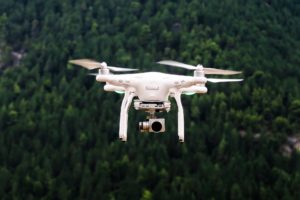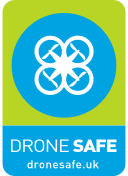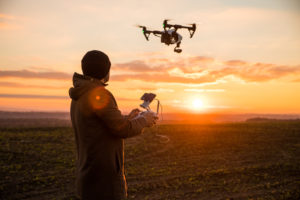Drones and the Law – What you need to know
Drones and the Law
Unsurprisingly, here is a legal framework that governs the use of drones. A number of different drones are available for the public to buy. There are a number of potential risks to ownership, and it would be helpful for any owner to know the relevant information about drones and the law, including an owner’s responsibilities and restrictions on their use.
Drones are again making the news with stories of substantial flight disruptions caused by drones being flown close to airports or the steps being taken to stop drones flying contraband into prison.
What are drones?
A ‘Drone’ is any object that can be flown without a human pilot. The definition ranges from armed technologies used in military operations to smaller gadgets that any of us can buy.
 It is the second category that will be the focus of this article. These items are controlled remotely from either a handset or mobile phone. They may also have a camera attached which provides a live-feed to the controller or can take still photography.
It is the second category that will be the focus of this article. These items are controlled remotely from either a handset or mobile phone. They may also have a camera attached which provides a live-feed to the controller or can take still photography.
At their best they provide educational, professional and leisure pursuits. Various models are available which will vary in size, speed, range and price.
When do drones become a problem?
Drones become a problem when they interfere with other objects using the same airspace. For example, they can present a problem for both military and civilian aircraft. Although they are of relatively small size, a collision can have disastrous consequences. Such incidents are most likely to happen when drones are flown too high or too close to areas where aircraft are taking off and landing frequently.
What are the rules?
If you have bought a drone for personal use, then law imposes some responsibilities relating to your use of that drone. Any breach of these duties can result in your prosecution.
 It is advisable to consult the Civilian Aviation Authority Air Navigation Order 2016, specifically Articles 94, 95 and 241. You can download the ‘Drone Code’ here.
It is advisable to consult the Civilian Aviation Authority Air Navigation Order 2016, specifically Articles 94, 95 and 241. You can download the ‘Drone Code’ here.
You must understand your essential duties as a drone owner, many of which are common sense:
- know how to fly your drone safely, and do so within the law
- understand that the operator is legally responsible for every flight
- keep your drone in sight at all times – stay below 400ft or 120m
- don’t fly your drone over or within 150m of a congested area or organised open air assemblies of more than 1000 people
- never fly within 50 metres of a person, vehicle or building not under your control
- ensure any images you obtain using the drone do not break privacy laws
- avoid collisions – you should never fly a drone near an airport or close to aircraft.
One important aspect of drones and the law is that it is a criminal offence to endanger the safety of any aircraft in flight.
If you break the rules, you could threaten lives and also face prosecution. In some cases this can result in imprisonment or a substantial fine.
For example, anybody caught breaching the rules in relation to airport boundaries could be charged with ‘recklessly or negligently acting in a manner likely to endanger an aircraft or any person in an aircraft’ and face a fine of up to £2500 or up to 5 years in prison.
Are there extra rules when using drones for commercial purposes?
It may be that you intend to use a drone for commercial purposes. For example, an estate agent might wish to take aerial video or photographs of properties for sale.
If this is the case then then permission must be sought from the Civilian Aviation Authority. It is also expected that you will attend an accredited course which will test your knowledge of and competence with drones.
What about cross-overs into the military’s use of drones?
Any drone use completed for the Ministry of Defence is regulated by the Military Aviation Authority. This might include tasks such as surveys at height, photography and other multimedia activities. Anyone likely to undertake such work should look at Regulatory Articles 1600, 2320 and 2321 for specific requirements.
New government plans
Over the summer of 2018 the Government launched a public consultation on new proposals that include:
- whether the 1km flight restriction around aerodromes is sufficient
- police issuing fixed penalty notices to people flouting drone laws
- new counter-drone technology to protect public events and critical national infrastructure, as well as stopping contraband reaching prisons
- a minimum age requirement of 18 to be a small drone operator
- apps upon which flight plans would be uploaded prior to take-off
Fixed penalty notices may be introduced for the following offences:
- not producing proof of registration at the request of a police constable
- not producing evidence that a flight plan or other permissions had been obtained or submitted
- not complying with a police request to land a drone
- flying a drone without the necessary competency
Drone users in the UK will have to register with the CAA and take online safety awareness tests from November 2019 for drones weighing at least 250g. A failure do do so could lead to a fine of up to £1000.
Drones weighing more than 250g could also be banned from flying near airports, or above 400 ft, in a crackdown on unsafe flying.
Police will also be given new powers to seize and ground drones which may have been used in criminal activity.
The bottom line
Drones can be fun and useful but come with their fair share of responsibilities. If you follow the principles highlighted above, you will be much less likely to fall foul of the rules and regulations governing this exciting new technology.
If, however, you are to be spoken to by any authority for breach of the rules and regulations then you ought to seek advice. Any interview is likely to be with the intention of considering whether a prosecution ought to be brought before the court.
We offer independent legal advice on drones and the law for such interviews whether in or out of office hours. Your nearest office can be found here although we provide our services nationwide.

Alternatively you can use the contact form below.


